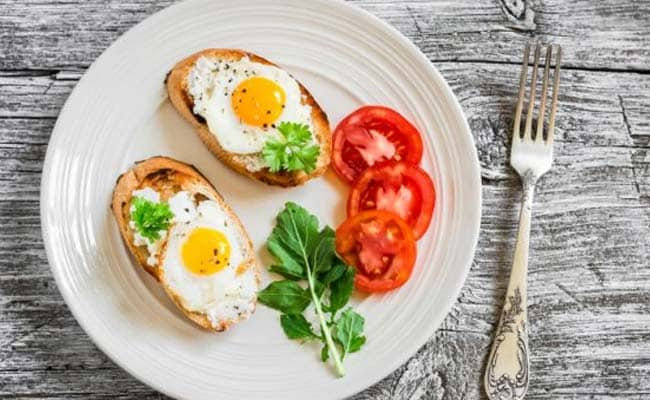Eggs are the ultimate breakfast staple. Whether you are a college student cooking in a cramped hostel kitchen or a seasoned home chef with a pantry full of spices, chances are you have cracked open an egg or two to start your day. But when it comes to how we cook them, the debate is far from settled: poached or fried? One is delicate, clean, and health-forward. The other is bold, crispy, and deeply satisfying. But which one is easier to cook at home? And more importantly, which one is kinder to your stomach, especially if you are watching your fat intake or dealing with digestive issues?
Let us break it down in details - from cooking techniques and nutrition to taste and digestibility - to help you settle the egg debate once and for all.
Also Read: Which Egg Is Better For Weight Loss - Boiled Or Fried
Fried Eggs - Fast And Familiar
Fried eggs are the undisputed champions of convenience. All you need is a pan, a bit of oil or butter, and a few minutes. Whether you like them sunny side up, over-easy, or with crispy golden edges, fried eggs are quick, customisable, and forgiving. They are the kind of breakfast you can make half-asleep and still get right.
But they are not entirely foolproof. If the oil is too hot, the edges burn and the yolk overcooks. If the pan is not non-stick, you risk tearing the whites.
Poached Eggs - Look Fancy, But Are Simple
Poached eggs have a reputation for being fussy.
- The water needs to be just the right temperature
- The eggs must be fresh
- A splash of vinegar is essential
And then there is the whirlpool technique, which is a move that feels more like a barista's latte art than a breakfast hack. But here is the truth: once you get the hang of it, poaching is surprisingly simple. And the payoff is worth it. You get a soft, cloud-like egg with a runny yolk and no added fat.
Fried Or Poached Eggs: Which One Suits Your Gut?
While both styles are delicious, they do not sit the same way in your stomach, especially if you are prone to bloating, acidity, or sluggish digestion.
According to health experts, poached eggs are easier to digest than their fried counterparts. The reason is simple. Peached eggs are cooked gently in water, without any added fat, which helps preserve the protein structure and makes them lighter on the gut.
Fried eggs, while undeniably tasty, come with a heavier footprint. The oil or butter used in frying adds extra fat, which can slow down digestion. High-heat cooking may also oxidise cholesterol in the yolk, potentially triggering inflammation or discomfort in sensitive individuals.
Also Read: 6 High-Protein Egg Recipes Every Gym Lover Swears By
Poached Vs Fried Eggs: The Nutritional Face-Off:
Both poached and fried eggs offer high-quality protein, essential vitamins like B12 and D, and minerals such as selenium and choline. But the cooking method does impact the final calorie and fat content.
| Nutrient | Poached Egg (1 large) | Fried Egg (1 large) |
| Calories | 72 | 90-120 |
| Protein | 6.3 g | 6.7 g |
| Fat | 5 g | 7-10 g |
| Cholesterol | 186 mg | 186 mg |
| Added Fat | 0 g | Depends on oil used |
This means, if you want the lowest-calorie option, choose poached or boiled. They add almost no extra fat but keep the protein intact.
The Taste Test: Craving Comfort Or Clean Eating?
Taste is subjective, but texture plays a big role in how we enjoy our eggs. Fried eggs are rich, crispy, and indulgent. The golden edges, the gooey yolk, the sizzle in the pan define comfort food at its finest. They pair beautifully with toast, parathas, fried rice, or even a juicy burger.
Poached eggs, on the other hand, are soft, clean, and elegant. The whites are silky, the yolk runny, and the flavour subtle. They shine in dishes like eggs benedict, grain bowls, or a minimalist avocado toast. If fried eggs are a warm hug, poached eggs are a gentle nudge toward wellness.
Also Read: Eggs Handling Tips: How To Buy, Store, Cook And Eat Eggs To Avoid Food Poisoning
The Mistakes You Are Probably Making - And How To Fix Them?
Even the humble egg can go wrong. With poached eggs, the biggest mistake is using water that is too hot or eggs that are not fresh. This causes the whites to scatter and the yolk to overcook. A gentle simmer, a splash of vinegar, and fresh eggs are key.
Fried eggs, meanwhile, suffer when the oil is too hot. The edges burn, the yolk cooks too fast, and the egg may stick to the pan. A non-stick skillet and medium heat are your best friends here.
Trying To Eat Healthier? Here Is What To Choose
If you are on a weight-loss journey, managing cholesterol, or following a low-fat diet, poached eggs are a natural fit. They are low in calories, free from added fats, and easy on the digestive system.
That said, fried eggs can be made healthier with a few smart swaps. Use cold-pressed oils, cook on low heat, and pair them with fibre-rich foods like whole grains or sauted greens.
"What matters most is total daily calories, meal balance (protein plus fibre), and consistency," says consultant nutritionist Mala Chatterjee.
Also Read: 6 Easy Tips To Make Perfect Eggs Sunny Side Up

Food Pairings That Make Each Egg Shine:
Fried eggs are perfect for hearty meals. Their bold flavour and crispy texture make them a great match for savoury dishes.
- Breakfast platters
- Sandwiches
- Fried rice
- Noodles and ramen bowl
Poached eggs, on the other hand, are ideal for lighter, more refined meals.
- Avocado toast
- Grain bowls
- Light salad
- Eggs benedict
The Bottom Line: Which Egg Wins? That Depends On You
Fried eggs are quick, crispy, and comforting. Poached eggs are light, healthy, and elegant. Both are nutritious, delicious, and versatile. The real question is not which one is better; it is which one suits your mood, health goals
About Somdatta SahaExplorer- this is what Somdatta likes to call herself. Be it in terms of food, people or places, all she craves for is to know the unknown. A simple aglio olio pasta or daal-chawal and a good movie can make her day.






